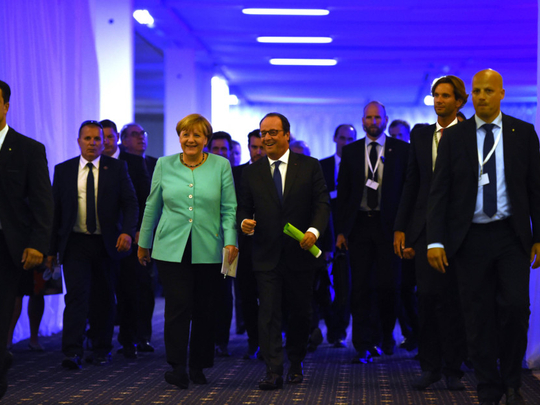
‘European leaders did not mince words on the state of the European Union [EU] as they headed into a meeting in Bratislava to chart the union’s future after the British vote in June to leave the EU,” said the New York Times in an editorial. The paper went on to examine the reasons behind the disappointing turn of events. “Chancellor Angela Merkel of Germany warned that Europe was in a critical situation, or what the president of the European Commission, Jean-Claude Juncker, called an existential crisis. Reeling from terrorist attacks, an influx of refugees from Africa and the Middle East, and persistent high unemployment and low economic growth, millions of Europeans are coming to the conclusion that the EU has let them down. And they are turning in increasing numbers to populist movements and nationalist politicians who promise to protect their jobs, their way of life and their security by closing national borders and rejecting Pan-European solutions,” it said.
It added: “If the European Union is to survive, European leaders must restore people’s faith in its ability to address Europe’s problems. As the European Council President, Donald Tusk, put it, “History has taught us that this can lead to a massive turn away from freedom and the other fundamental values that the European Union is founded upon.”
The Guardian took a more caustic view of things in an editorial titled “The EU: struggling with the vision thing”.
“Just as it is hard to exaggerate the recklessness or downright ignorance of those who promised a painless Brexit, it is hard to ignore that European partners find themselves at a loss when it comes to charting the next steps for the continent.” Advising the EU of a more pragmatic stance rather than ruing the loss of a key member state, the paper said: “Whatever the topic, be it anti-terrorism, defence or migration, the EU-27 are well aware they need to demonstrate pragmatism, not lofty ideals, if they want to convince increasingly sceptical voters that the European project can deliver.”
The Financial Times weighed in on the context of the situation and said: “In Slovak lore, Bratislava Castle is said to resemble a table turned upside down. Perched high above the Danube, it was in this imposing monument to Europe’s torn history that EU leaders gathered to try to right a project upended by Brexit and other blows.” Continuing the anecdotal references, the paper said: “Agreeing on how to proceed in political real time will be difficult. The Bratislava summit ... put off the moment of pain in which big political compromises will be needed.”
The Daily Nation in Kenya, meanwhile, expressed concerns about the future of cooperation between East Africa and an indecisive EU. “The signing of a trade pact with the European Union for free market access for East Africa’s horticultural crops about a decade ago significantly improved foreign earnings for the region. In the trade agreement, EU treats East Africa as a single trade entity and offers it a common package ... Clearly, the hesitation over signing the partnership exemplifies the challenges of regional economic blocs.”




_resources1_16a31069e4e_small.jpg)







